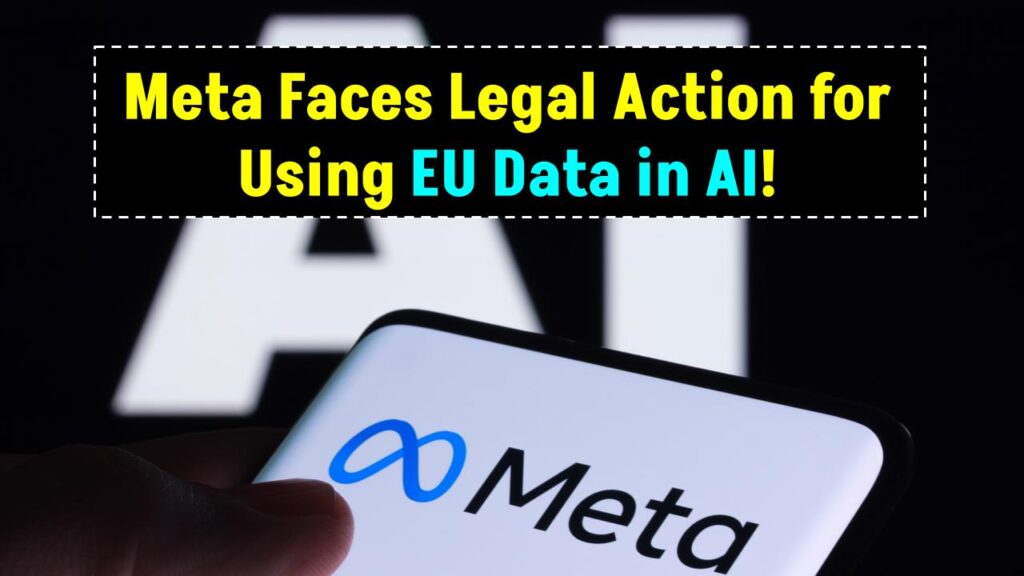Meta Receives Cease: In a rapidly evolving world of artificial intelligence, the question of how companies collect and use personal data has taken center stage. Meta Platforms, the parent company of Facebook and Instagram, recently found itself in legal hot water after announcing plans to use personal data from European Union (EU) users to train its AI systems, beginning May 27, 2025. But not everyone is on board. The Austrian privacy advocacy group NOYB (None of Your Business), led by well-known activist Max Schrems, has issued a cease-and-desist letter to Meta. Their demand? Stop using EU citizens’ personal data for AI training unless explicit user consent is obtained. This legal battle is shaping up to be a pivotal moment in the clash between technological innovation and privacy rights.

Meta Receives Cease
| Topic | Details |
|---|---|
| Company Involved | Meta Platforms |
| Issue | Use of EU personal data for AI training without explicit consent |
| Privacy Group | NOYB – None of Your Business |
| Legal Concern | Potential GDPR violation, collective redress possible |
| Deadline Given to Meta | May 21, 2025 |
| Training Start Date | May 27, 2025 |
| Meta’s Claim | Practices are GDPR-compliant, with opt-out option |
| Counter Argument | Critics say GDPR requires opt-in consent, not opt-out |
This legal standoff is just beginning, but it’s already sparking a vital conversation about how tech companies use our data. As AI continues to advance, so must our understanding and regulation of data ethics and consent. For now, Meta users in the EU should stay informed, exercise their GDPR rights, and watch closely as the May 21 deadline approaches. The future of AI privacy may very well be shaped by this landmark case.
Why This Matters: Understanding the GDPR Conflict
The General Data Protection Regulation (GDPR) is the EU’s gold-standard privacy law, requiring companies to handle data with transparency and fairness. Under GDPR, the idea of “legitimate interest” is sometimes used by companies to process data without consent—but only under strict conditions. Meta claims that its use of public posts and interactions falls under this category. However, NOYB and other critics argue that training large-scale AI models is a very different use case—one that cannot be justified without an opt-in.
What’s the Problem?
Once data is used to train AI models, it essentially becomes part of the model’s “brain.” Even if the original data is deleted, the patterns and insights learned from it remain. This makes data erasure rights difficult to enforce, leading to irreversible privacy risks.
“You can’t ‘un-teach’ an AI model,” says Max Schrems. “Once personal data is in there, it’s in there for good.”
Meta’s Side of the Story
Meta insists it’s complying with EU laws and has publicly stated that it:
- Will not use data from minors (under 18)
- Will not use private messages
- Will provide an opt-out for users who do not want their public data used But many privacy advocates and legal experts believe this isn’t enough. The German consumer protection group Verbraucherzentrale NRW has also sent a cease and desist letter, stating that an opt-out approach violates GDPR. Their demand? Meta must obtain explicit, informed, and voluntary consent from users—especially when it comes to something as sensitive as training AI.
Practical Advice for EU Users: What Can You Do?
If you’re a Facebook or Instagram user in the EU, you may be wondering: “Can I stop Meta from using my data for AI training?” The answer is yes—but you need to act.
Step-by-Step Guide to Opting Out
- Visit Your Account Settings on Facebook or Instagram
- Navigate to Privacy Settings
- Look for the section titled AI and Data Usage (expected to go live mid-May)
- Submit a Data Use Objection under GDPR rights
- Save confirmation and track any communication from Meta Note: Keep an eye on Meta’s official privacy updates for new forms or opt-out processes.
Why This Case Could Set a Precedent
This isn’t just a single skirmish. It could define how companies use personal data in AI training across the entire European Union—and possibly beyond. If NOYB and the German consumer watchdog succeed in legal action, we could see:
- Class-action lawsuits under the EU Collective Redress Directive
- Heavy fines for Meta (up to 4% of global turnover under GDPR)
- Tighter EU regulations around AI development and data use This would have huge ripple effects across industries like tech, advertising, and digital marketing.
The Bigger Picture: Innovation vs. Privacy
Meta’s move comes at a time when companies are racing to build more powerful AI models. These models thrive on vast amounts of real-world data, and social media content is a goldmine. However, there’s a delicate balance between innovation and individual rights. Privacy advocates argue that just because the data is public doesn’t mean it’s fair game—especially not for training algorithms that could later be used in commercial, surveillance, or profiling tools.
“Privacy is a fundamental human right,” says the European Data Protection Board (EDPB). “Its protection must not be compromised for technical convenience.”
FAQs on Meta Receives Cease
1. Is my private data being used for AI training?
No. Meta states that private messages and data from users under 18 are excluded.
2. How can I object to my data being used?
Visit your account settings, look for the AI data usage section, and submit a formal objection.
3. What happens if I don’t opt out?
Your public content may be used to train Meta’s AI systems starting May 27, 2025.
4. Can I delete data that’s already been used?
Once data is used to train an AI model, removing it is difficult. This is part of the controversy.
5. Who is leading the legal challenge?
NOYB, an Austrian privacy advocacy group, and Verbraucherzentrale NRW in Germany.





